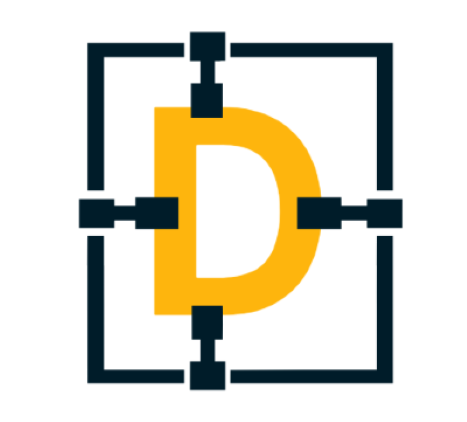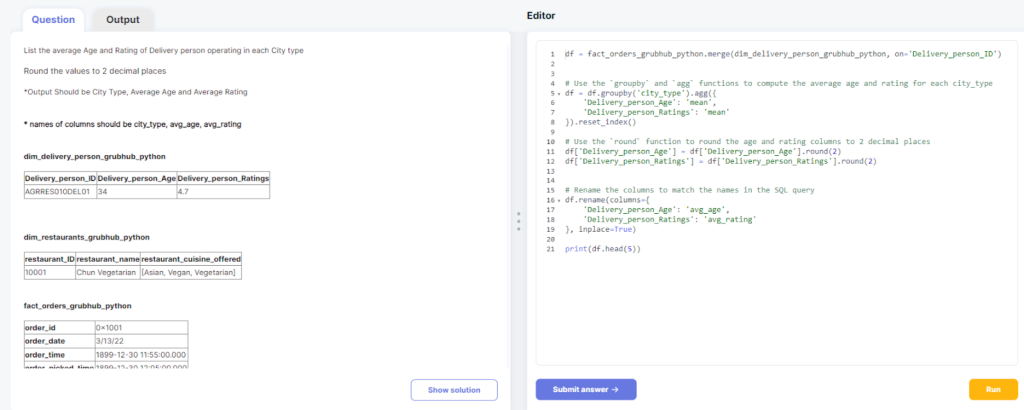Python Data Engineer Interview
 Christopher Garzon
Christopher GarzonAbout Python course
Start programming with our comprehensive Python course. Spanning two distinct modules, students first delve into ‘Python DataFrames’ where they explore data manipulation and analysis techniques.
In ‘Python Algorithms’, learners will uncover the mechanics of effective problem-solving, from basic to advanced algorithms. Whether you’re a novice or looking to refine your skills, this course offers deep insights into Python’s vast capabilities.
What you’ll learn
Upon completing the Python course, you’ll not only be proficient in handling and analyzing data with Python but also possess a foundational understanding of algorithms, empowering you to solve complex problems with optimized solutions. Outlined below are the modules, accompanied by the essential skills attainable upon their completion:
Snowflake: Utilize Python’s powerful libraries to interact with Snowflake, enabling you to dive into both the basic and advanced functionalities of this premier cloud data platform.
AWS: Extend your Python skills to AWS, where you can automate cloud tasks, manage storage, utilize computational resources, and tap into the myriad of AWS solutions pivotal for data engineering.
Tableau: While primarily a visualization tool, discover how Python can interface with Tableau to automate tasks, process data, and elevate your visualization techniques.
DBT: Combine Python with DBT to streamline analytics engineering. Manage data transformations, tests, and documentation more efficiently in modern cloud platforms.
Kafka: Integrate Python with Kafka to enhance real-time data streaming capabilities. Develop robust, high-throughput data pipelines, ensuring dynamic data integration and processing.
DBT (Data Build Tool): Combine Python with DBT to streamline analytics engineering. Manage data transformations, tests, and documentation more efficiently in modern cloud platforms.
Kafka: Integrate Python with Kafka to enhance real-time data streaming capabilities. Develop robust, high-throughput data pipelines, ensuring dynamic data integration and processing.
Syllabus
Python DataFrames Module:
Discover the essence of Python’s popular data manipulation tool, the DataFrame, powered by the pandas’ library.
Learn data cleaning methods to transform raw data into informative datasets prepared for analysis.
Familiarize yourself with essential DataFrame operations like slicing, indexing, and merging.
Python Algorithms Module:
Explore the essence of algorithms and understand their pivotal role in effective Python programming.
Master sorting techniques like quicksort, mergesort, and heapsort, and understand their applications.
Learn data structures such as trees, graphs, and linked lists, crucial for optimized algorithmic solutions.
Explore search algorithms, including binary search and breadth-first search, and their relevance in real-world scenarios.
Why Learn Python?
There are many reasons to get proficient with Python:
Handle Diverse Tasks: Whether you’re looking at web development, data analysis, automation, or machine learning, Python has tools and libraries that can help. This adaptability means that with Python, you can tackle a wide range of projects and problems effectively.
Versatility across Platforms: Python is a cross-platform language. This means whether you’re using Windows, MacOS, or Linux, Python works seamlessly. This platform-agnostic nature ensures that projects built using Python can be easily shared and executed without much hassle.
Overall, mastering Python can elevate your proficiency as a software developer, enhance your career prospects, and empower you to devise innovative solutions grounded in technology.
Interactive Python Course Simulators

How Long Does It Take to Learn Python?
The ‘Python DataFrames’ module, which introduces Python’s potent tools for data manipulation and analysis, around 2-3 weeks of consistent study for most learners. The ‘Python Algorithms’ module, a more advanced segment, could take an additional 3-4 weeks for a beginner to understand and apply these algorithms in Python. So, acquiring a foundational grasp of Python through both these modules roughly spans 5-7 weeks.
Who should Learn Python?
Beginners
Web Developers
Data Scientists & Analysts
Finance Professionals
Artificial Intelligence & Machine Learning Engineers
Motivation for Learning Python
Learning Python offers myriad benefits and opportunities for those considering a career in software development or data science:
Python’s adaptability makes it perfect for various tasks, from web development and data analysis to artificial intelligence.
Python works well with other languages, enabling the integration of the best features from various coding environments.
Companies across industries are on the lookout for professionals proficient in Python, hinting at its relevance in today’s job market.
Subscribe to my newsletter
Read articles from Christopher Garzon directly inside your inbox. Subscribe to the newsletter, and don't miss out.
Written by

Christopher Garzon
Christopher Garzon
The goal of data engineer academy is to help people do two things. Learn the skills needed to be in data related roles and learn how to ace the interviews as well. We believe data related roles are in the early phases of their growth. And in addition to learning the skills, learning how to pass the interviews are just as important and our goal is to create clarity when it comes to both of those skillets.